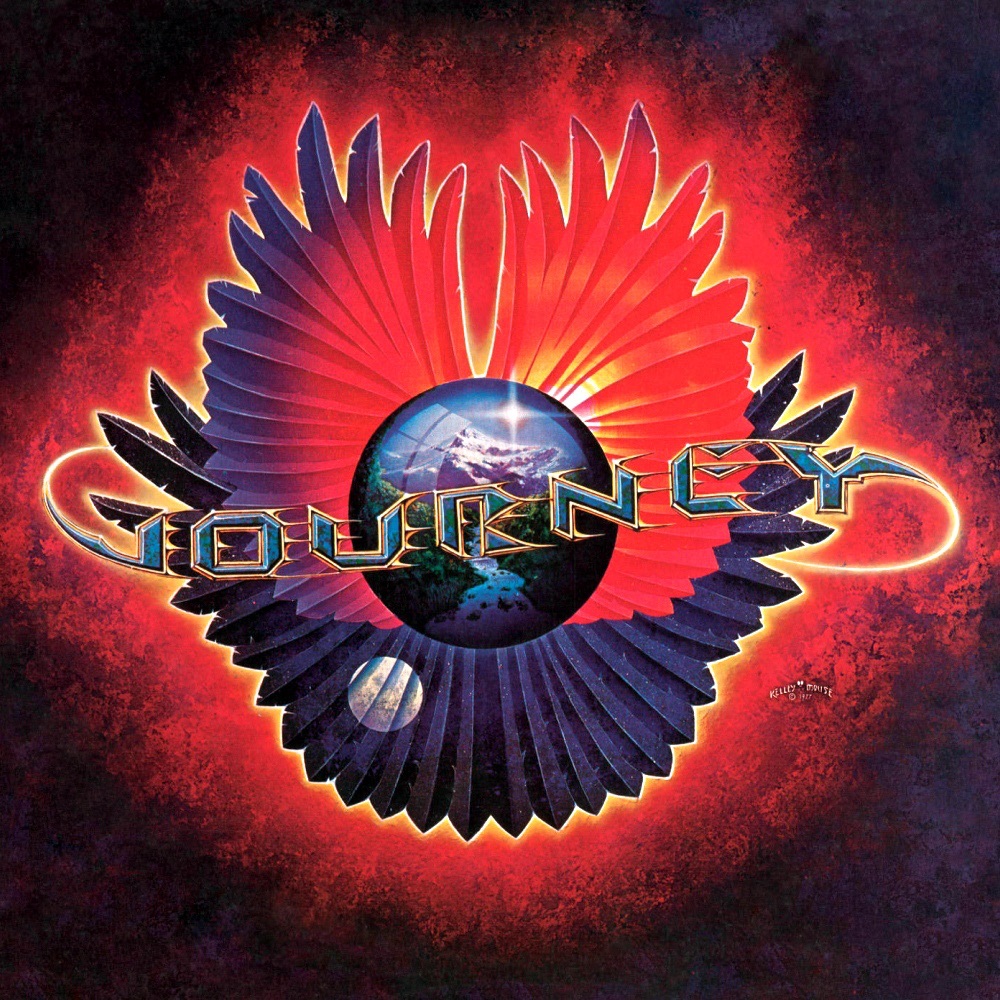
Infinity is Journey's fourth studio album, released 1978 on Columbia. It was the band's first album with vocalist Steve Perry, as well as the last to feature drummer Aynsley Dunbar.
Perry came from a band called Alien Project and replaced vocalist Robert Fleischman, who was the band's vocalist between the Next and Infinity albums. Fleischman probably wanted to keep the Journey gig, but his style and musical direction clashed with the band's and Perry was snuck in midway through a tour to replace him. To avoid alarming Fleischman about what they were up to, Perry was initially introduced to Fleischman as a roadie's Portuguese cousin. During a sound check in Long Beach, he performed a song with the band while Fleischman was away from the stage, and the stage, so to speak, was set.
Fleischman would later become the first singer of the Vinnie Vincent's Invasion. Vincent had just been turfed by Kiss.
Right off the bat Perry teamed with guitarist Neal Schon to write Patiently, a pretty little ballad that appears on this album. Perry wrote the lyrics, which expresses the sadness of being on the road and away from loved ones. The song became a popular single, along with Lights and Wheel in the Sky, the latter co-written by Fleischman.
Roy Thomas Baker produced Infinity, using a layered sound approach similar to what he was doing with Queen. He stacked harmonies on top of each other, something that would become a Journey trademark, by having each vocalist sing each harmony part in unison. This had the effect of making three or four voices sound like more, and is perhaps most notable on Feeling that Way and Anytime, which are presented back-to-back on the record and were often played like that in concert.
But I've always had a problem with the sound of this record. Even on a decent system like mine it sounds as if the music is being filtered through a basket of laundry. It's woolly and compressed sounding. I have the same problem listening to the five Queen records Thomas Baker was involved with (well, Jazz isn't terrible sounding) so maybe it's him that I'm hearing. I've tried listening to the CD, the remastered CD and other vinyl pressings of this record (I had the half-speed master for a while) but it made no real difference and the record sounds as though my speakers are wrapped in several layers of winter socks. I'd love to see Journey return to the studio to remix and remaster this record in a way that removes all that sonic lint from it, which I think would sound leaps and bounds beyond what we have here.
Journey has had - still has - a bit of a revolving door on its employees' entrance. At the time Infinity was being put together the band consisted of vocalist and keyboardist Gregg Rolie, guitarist Neal Schon, bassist Ross Valory and drummer Aynsley Dunbar. Prior to the recording of this LP the band was told by their record company that they had to deliver a hit this time - or else! Their three previous albums had been artistically ambitious but commercially disappointing - and the record company now wanted to start seeing a return on their investment.
Manager Herbie Herbert felt part of the problem was the lack of a dedicated singer. Rolie was trapped behind his keyboard and was therefore limited in his ability to deliver as a front man-singer. He certainly couldn't unleash the kind of stage presence a true front man could, so the band started auditioning singers and that's how Fleischman ended up in the position. He recorded some demos before being replaced by Steve Perry, who the band thought was more suitable and allowed Journey to more-or-less rebirth themselves as a hit making machine that would begin spewing hook-laden hit singles beginning with this record.
Given Journey's success with Steve Perry, its interesting to note that he was not the unanimous choice as the band's new singer. But when he helped write the song Lights with Schon, he seemed to win over the rest of the band, who could sense the possibilities (and probably also the accompanying monetary reward). The song was chosen as Infinity’s opening track and today remains one of Journey's best-loved songs.
There is reason to not stop believing that Perry, with his extraordinary vocal ability, was largely responsible for rescuing Journey from the pro-rock scrap heap, and while this album marks their beginning as one of rock's most commercially successful acts - and while the songwriting is wonderful and the performances exceptional - I wish it sounded better than it does.
Infinity is Journey's fourth studio album, released 1978 on Columbia. It was the band's first album with vocalist Steve Perry, as well as the last to feature drummer Aynsley Dunbar.
Perry came from a band called Alien Project and replaced vocalist Robert Fleischman, who was the band's vocalist between the Next and Infinity albums. Fleischman probably wanted to keep the Journey gig, but his style and musical direction clashed with the band's and Perry was snuck in midway through a tour to replace him. To avoid alarming Fleischman about what they were up to, Perry was initially introduced to Fleischman as a roadie's Portuguese cousin. During a sound check in Long Beach, he performed a song with the band while Fleischman was away from the stage, and the stage, so to speak, was set.
Fleischman would later become the first singer of the Vinnie Vincent's Invasion. Vincent had just been turfed by Kiss.
Right off the bat Perry teamed with guitarist Neal Schon to write Patiently, a pretty little ballad that appears on this album. Perry wrote the lyrics, which expresses the sadness of being on the road and away from loved ones. The song became a popular single, along with Lights and Wheel in the Sky, the latter co-written by Fleischman.
Roy Thomas Baker produced Infinity, using a layered sound approach similar to what he was doing with Queen. He stacked harmonies on top of each other, something that would become a Journey trademark, by having each vocalist sing each harmony part in unison. This had the effect of making three or four voices sound like more, and is perhaps most notable on Feeling that Way and Anytime, which are presented back-to-back on the record and were often played like that in concert.
But I've always had a problem with the sound of this record. Even on a decent system like mine it sounds as if the music is being filtered through a basket of laundry. It's woolly and compressed sounding. I have the same problem listening to the five Queen records Thomas Baker was involved with (well, Jazz isn't terrible sounding) so maybe it's him that I'm hearing. I've tried listening to the CD, the remastered CD and other vinyl pressings of this record (I had the half-speed master for a while) but it made no real difference and the record sounds as though my speakers are wrapped in several layers of winter socks. I'd love to see Journey return to the studio to remix and remaster this record in a way that removes all that sonic lint from it, which I think would sound leaps and bounds beyond what we have here.
Journey has had - still has - a bit of a revolving door on its employees' entrance. At the time Infinity was being put together the band consisted of vocalist and keyboardist Gregg Rolie, guitarist Neal Schon, bassist Ross Valory and drummer Aynsley Dunbar. Prior to the recording of this LP the band was told by their record company that they had to deliver a hit this time - or else! Their three previous albums had been artistically ambitious but commercially disappointing - and the record company now wanted to start seeing a return on their investment.
Manager Herbie Herbert felt part of the problem was the lack of a dedicated singer. Rolie was trapped behind his keyboard and was therefore limited in his ability to deliver as a front man-singer. He certainly couldn't unleash the kind of stage presence a true front man could, so the band started auditioning singers and that's how Fleischman ended up in the position. He recorded some demos before being replaced by Steve Perry, who the band thought was more suitable and allowed Journey to more-or-less rebirth themselves as a hit making machine that would begin spewing hook-laden hit singles beginning with this record.
Given Journey's success with Steve Perry, its interesting to note that he was not the unanimous choice as the band's new singer. But when he helped write the song Lights with Schon, he seemed to win over the rest of the band, who could sense the possibilities (and probably also the accompanying monetary reward). The song was chosen as Infinity’s opening track and today remains one of Journey's best-loved songs.
There is reason to not stop believing that Perry, with his extraordinary vocal ability, was largely responsible for rescuing Journey from the pro-rock scrap heap, and while this album marks their beginning as one of rock's most commercially successful acts - and while the songwriting is wonderful and the performances exceptional - I wish it sounded better than it does.


